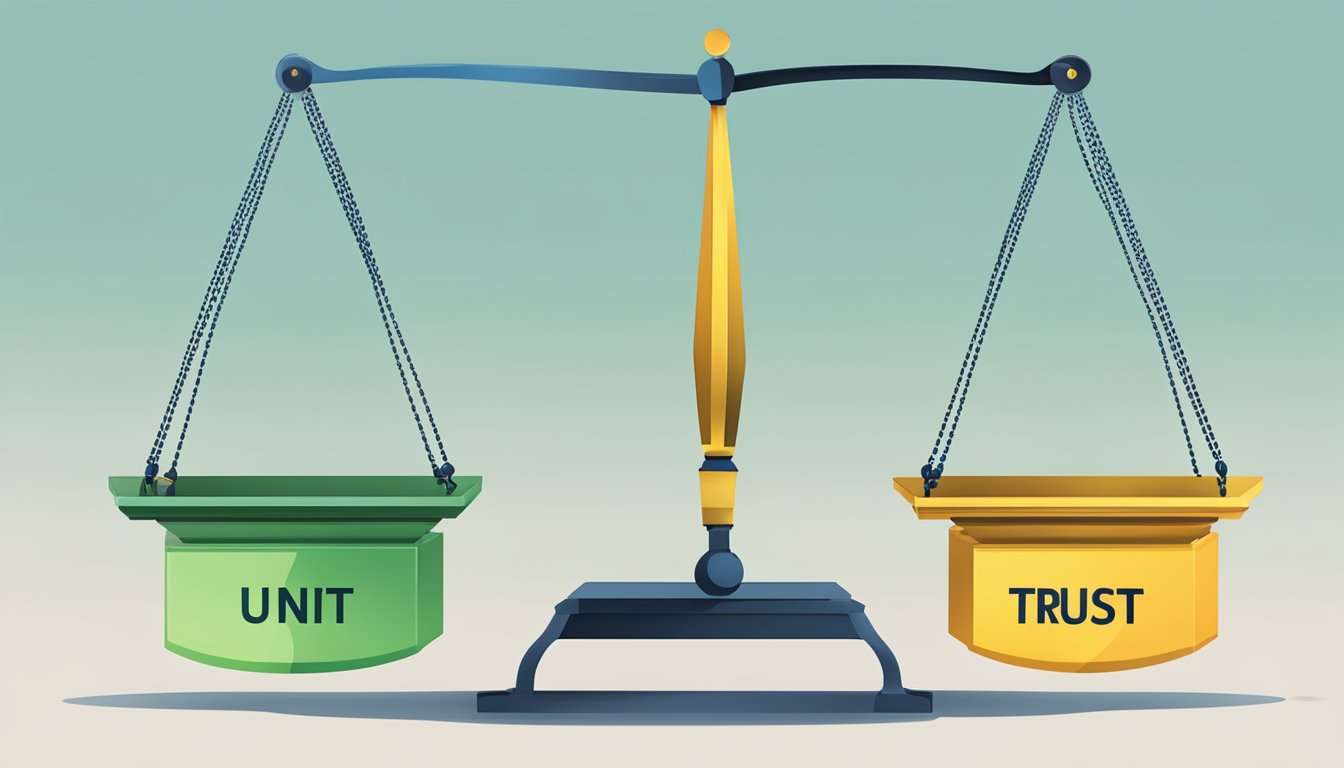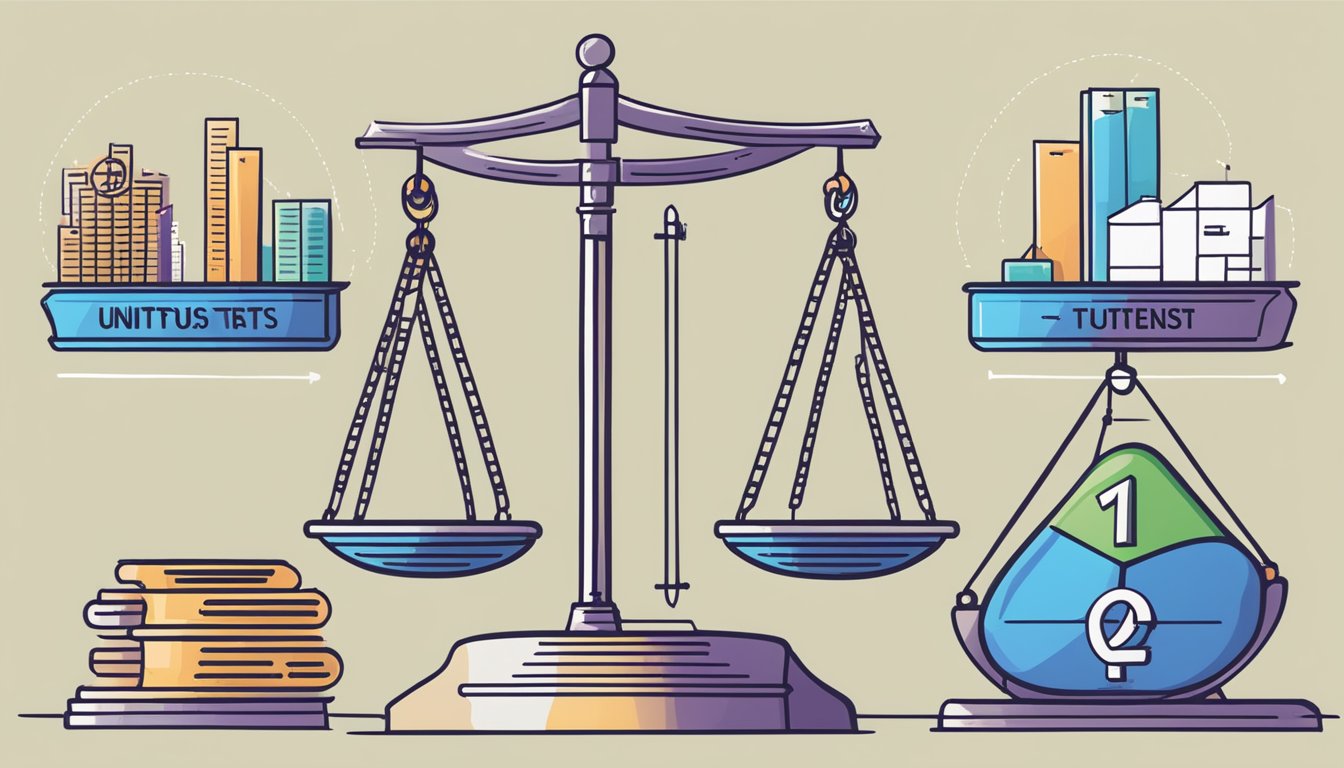Are you interested in investing your money but unsure of the best way to do so? Two popular investment options are unit trusts and exchange-traded funds (ETFs). While both of these investment vehicles allow you to invest in a diversified portfolio of assets, they have some key differences you should be aware of before making a decision.

Unit trusts are investment funds that pool money from multiple investors to buy a portfolio of assets, such as stocks, bonds, and real estate. When you invest in a unit trust, you are buying units in the fund, and the value of your investment is determined by the value of the underlying assets. ETFs, on the other hand, are traded on stock exchanges like individual stocks. They also invest in a portfolio of assets, but they are structured differently than unit trusts, and their prices can fluctuate throughout the day based on supply and demand.
Understanding the differences between unit trusts and ETFs can help you make an informed investment decision that aligns with your financial goals. In this article, we will explore the key differences between these two investment options, including their fees, liquidity, and performance. By the end of this article, you should have a better understanding of which investment vehicle is right for you.
1 Min Read
Can’t decide between unit trusts and ETFs? Don’t worry, this quick guide will break down the essentials.
Looking for diversification but short on time? ETFs might be your match. Traded like stocks, they offer a basket of investments that mimic a market index. Prices fluctuate throughout the day, but fees are typically low.
Prefer a hands-off approach with professional management? Unit trusts could be a good fit. These actively managed funds pool investor money to buy a variety of assets. While convenient, they may come with higher fees and less liquidity (bought/sold only once daily).
The choice depends on your goals. ETFs suit investors seeking a cost-effective, passive approach. Unit trusts appeal to those who value professional guidance and are comfortable with potentially higher fees.
Do more research to see which aligns better with your investment strategy!
Understanding Unit Trusts

If you’re new to investing, you may have come across the term “unit trusts” before. So, what exactly are they and how do they differ from ETFs?
Structure and Functioning
Unit trusts are a type of investment product that pools money from multiple investors to create a portfolio of assets. When you invest in a unit trust, you’re essentially buying units of the trust, which represent a portion of the underlying assets. These assets can include a variety of securities such as stocks, bonds, and other financial instruments.
The trust is managed by a fund manager who is responsible for making investment decisions on behalf of the investors. The fund manager’s goal is to generate returns for the investors by buying and selling securities within the trust’s portfolio.
Investment Strategy
Unit trusts can be actively managed, meaning that the fund manager is constantly buying and selling securities to try and beat the market. Alternatively, they can be passively managed, meaning that the fund manager simply tracks a particular market index.
Costs and Fees
When you invest in a unit trust, you’ll typically pay two types of fees: management fees and sales charges. Management fees are charged annually and are a percentage of the trust’s net asset value (NAV). Sales charges, also known as front-end loads, are one-time fees that are charged when you buy units in the trust.
Liquidity and Trading
Unit trusts are generally considered to be less liquid than ETFs. This is because they are priced only once a day, at the end of the trading day. This means that if you want to sell your units, you may have to wait until the end of the day to get a price. In contrast, ETFs are traded on an exchange throughout the day, which means that you can buy and sell them at any time during trading hours.
Exploring Exchange-Traded Funds (ETFs)

If you’re looking for a low-cost, passive way to invest in a broad range of stocks, exchange-traded funds (ETFs) may be the perfect fit for you. ETFs are similar to index funds in that they track a specific index, such as the FTSE 100, S&P 500, or NASDAQ. However, unlike traditional index funds, ETFs are traded on an exchange like individual stocks.
Basics of ETFs
ETFs are essentially a basket of stocks that are designed to track a specific index. When you buy an ETF, you’re buying a share of that basket of stocks. This means that you’re essentially buying a diversified portfolio of stocks in a single trade. ETFs are available for a wide range of indexes, including domestic and international stocks, bonds, and commodities.
Pricing and Value
ETFs are priced throughout the trading day, just like stocks. This means that the price of an ETF can fluctuate throughout the day based on supply and demand. The value of an ETF is determined by the total value of the underlying assets held by the fund. This value is calculated at the end of each trading day and is known as the net asset value (NAV).
Passive vs Active Management
Most ETFs are passively managed, which means that they track a specific index and are not actively managed by a fund manager. This makes ETFs a great choice for investors who are looking for a low-cost, passive way to invest in the stock market. However, there are also actively managed ETFs available, which are managed by a fund manager who makes investment decisions based on market conditions and other factors.
Associated Costs
ETFs are known for their low cost. The expense ratio, which is the annual fee charged by the fund to cover operating expenses, is typically lower for ETFs than for actively managed mutual funds. In addition to the expense ratio, there are other costs associated with ETFs, such as trading costs and the bid-ask spread. However, these costs are generally lower for ETFs than for individual stocks.
Comparing Unit Trusts and ETFs

When it comes to investing, you have a choice between two popular options: unit trusts and exchange-traded funds (ETFs). Both offer a way to invest in a diversified portfolio of assets, but they differ in several ways. In this section, we will compare the two investment options and explore their differences.
Performance and Returns
One of the main differences between unit trusts and ETFs is their performance and returns. Unit trusts are actively managed by portfolio managers who aim to outperform the market. On the other hand, ETFs are passively managed and aim to replicate the performance of a particular index or benchmark.
While unit trusts have the potential to generate higher returns than ETFs, they also come with higher fees and expenses. ETFs, on the other hand, have lower fees and expenses, which can result in higher net returns over the long term.
Risk and Diversification
Another key difference between unit trusts and ETFs is their risk and diversification. Unit trusts offer investors a diversified exposure to a range of assets, including technology, real estate, emerging markets, and more. This diversification can help to reduce risk and volatility in a portfolio.
ETFs also offer diversification, but they do so by tracking a particular index or benchmark. This means that ETFs may not offer the same level of diversification as unit trusts, but they are generally less risky and more cost-effective.
Accessibility and Convenience
Finally, unit trusts and ETFs differ in terms of accessibility and convenience. Unit trusts are typically sold through financial advisors or fund managers, which can make them less accessible to individual investors. ETFs, on the other hand, can be bought and sold on a stock exchange, just like shares, making them more accessible and convenient for individual investors.
Tip: Don’t underestimate the power of low fees!
ETFs tend to have significantly lower fees compared to unit trusts. This seemingly small difference can add up significantly over the long term, potentially boosting your overall returns! Consider the long game and choose cost-effective options!
Regional Focus: Unit Trusts and ETFs in Asia

Market Trends in Asia
Investors in Asia are increasingly looking to Unit Trusts and ETFs as a way to diversify their portfolios and gain exposure to different markets. According to Singapore Exchange (SGX), ETFs listed on SGX have seen strong growth in recent years, with assets under management (AUM) increasing by 23% in 2021 alone. This growth has been driven by a combination of factors, including the increasing popularity of passive investing and the growing interest in emerging markets.
One of the most popular ETFs in Asia is the iShares MSCI Emerging Markets ETF (EEM), which tracks the performance of large and mid-cap stocks in emerging markets such as China, South Korea, and Taiwan. This ETF has seen strong growth in recent years, with AUM increasing by 22% in 2021.
Popular Asian Unit Trusts and ETFs
When it comes to Unit Trusts, there are a number of popular options available to investors in Asia. One such option is the Nikko AM Shenton Global Opportunities Fund, which invests in a diversified portfolio of global equities. This fund has consistently outperformed its benchmark and has a strong track record of generating returns for investors.
Another popular option is the Aberdeen Standard Asia Focus Fund, which invests in a portfolio of high-quality companies in Asia. This fund has a strong focus on Japan and has a proven track record of delivering strong returns for investors over the long term.
Investment Considerations for Modern Portfolios

When it comes to building a modern investment portfolio, there are a few key considerations to keep in mind. Whether you’re an experienced investor or just starting out, it’s important to align your investment goals with your portfolio strategy, evaluate costs and performance, and navigate tax implications. Here are some tips to help you make informed investment decisions.
Aligning with Investment Goals
Before investing in any financial product, it’s important to have a clear understanding of your investment goals. Are you looking to generate income, grow your wealth, or both? Do you have a short-term or long-term investment horizon? Once you have a clear understanding of your investment goals, you can begin to evaluate different investment products, such as unit trusts and ETFs, to determine which ones align with your investment strategy.
Evaluating Costs and Performance
When evaluating different investment products, it’s important to consider both costs and performance. Unit trusts typically come with higher fees, such as management fees, upfront fees, trail fees, and miscellaneous fees, such as marketing, administration, and audit fees. On the other hand, ETFs tend to have lower fees and transaction costs, making them a more cost-effective option. It’s also important to evaluate the performance of different investment products, looking at factors such as net asset value (NAV) and historical returns.
Navigating Tax Implications
Finally, it’s important to consider tax implications when investing in different financial products. Unit trusts and ETFs are both subject to taxes, such as capital gains tax and income tax. However, the tax implications can vary depending on the investment strategy and sectors that the products are invested in. For example, some ETFs may offer tax advantages for investing in certain sectors, such as renewable energy or real estate. It’s important to consult with a tax professional to determine the tax implications of different investment products and strategies.
Expert Insights and Financial Advice

If you’re new to investing, you may be wondering whether to invest in unit trusts or ETFs. While both offer a diversified portfolio of securities, there are some key differences to consider. Here are some expert insights and financial advice to help you make an informed decision.
Working with Financial Advisors
If you’re not confident in your investment knowledge, working with a financial advisor can be a smart move. A financial advisor can help you determine your investment goals, assess your risk tolerance, and recommend a suitable investment strategy. They can also help you choose between unit trusts and ETFs based on your needs and preferences.
When working with a financial advisor, it’s important to choose someone who is qualified and experienced. Look for someone who is licensed and regulated by a reputable authority, such as the Financial Conduct Authority (FCA) in the UK. You should also ask about their fees and how they are compensated. Some financial advisors charge a flat fee, while others earn commissions on the products they sell.
DIY Investing vs Professional Management
If you prefer to manage your own investments, you can invest in unit trusts or ETFs through a broker. DIY investing can be a cost-effective way to invest, as you can avoid the fees associated with professional management. However, it’s important to do your research and choose high-quality funds that align with your investment goals.
Professional management can be beneficial if you don’t have the time or expertise to manage your own investments. Fund managers are responsible for selecting and managing the securities in the fund, which can help reduce your risk and increase your returns. However, professional management comes at a cost, and fees can eat into your returns over time.
When choosing between unit trusts and ETFs, it’s important to consider your investment goals, risk tolerance, and investment time horizon. Both unit trusts and ETFs can be suitable for long-term investors, but ETFs may be more suitable for short-term investors who want to trade frequently. It’s also important to consider the fees associated with each investment option and choose a high-quality fund that aligns with your investment goals and risk tolerance.
Global Perspectives on Unit Trusts and ETFs

Investment trends worldwide show that both unit trusts and ETFs are popular investment options. While the US is the largest market for ETFs, the UK and Ireland are the largest markets for unit trusts. In fact, unit trusts account for over 40% of the fund market in the UK.
Leading providers and products in the ETF market include BlackRock’s iShares, which has a dominant market share of around 38%. In contrast, Endowus and Syfe are leading providers of unit trusts in Singapore.
Investment Trends Worldwide
Globally, the popularity of ETFs has been on the rise in recent years, with total assets under management reaching $7.8 trillion in 2020. This growth can be attributed to the ease of buying and selling ETFs on the public market, as well as the proportional ownership of a diversified portfolio.
In contrast, unit trusts have been around for much longer and are still a popular investment option in many countries. In the UK, for example, unit trusts account for over 40% of the fund market. This can be attributed to the active management of unit trusts, which allows investors to benefit from the expertise of professional fund managers.
Leading Providers and Products
BlackRock’s iShares is the largest provider of ETFs globally, with a dominant market share of around 38%. The company offers a wide range of ETFs, including energy-focused ETFs such as ticker.
In Singapore, Endowus and Syfe are leading providers of unit trusts. Endowus offers access to over 3,500 unit trusts from more than 200 fund managers, while Syfe offers a range of diversified portfolios that are tailored to different risk profiles.
Frequently Asked Questions
How do ETFs and unit trusts differ in terms of investment structure?
ETFs and unit trusts differ in their investment structure. Unit trusts are actively managed by a fund manager who selects and manages a portfolio of assets on behalf of investors. On the other hand, ETFs are passively managed and track a particular index or benchmark. This means that ETFs have a fixed portfolio of assets that reflect the underlying index or benchmark.
Which offers better returns, unit trusts or ETFs, and why?
There is no clear winner between unit trusts and ETFs in terms of returns. Both investment vehicles have their respective benefits and risks. Unit trusts are actively managed, which means a fund manager can make investment decisions based on market trends and other factors that could impact the performance of the investment. ETFs, on the other hand, are passively managed and track a particular index or benchmark. This means that ETFs have lower management fees, which could result in higher returns for investors.
What are the main contrasts between unit trusts and mutual funds?
Unit trusts and mutual funds are similar in that they both pool money from investors to invest in a portfolio of assets. However, there are a few key differences between the two. Unit trusts are open-ended investment vehicles, meaning that new units can be created or redeemed at any time. Mutual funds, on the other hand, are closed-end investment vehicles that have a fixed number of shares. Additionally, unit trusts are actively managed, while mutual funds can be actively or passively managed.
Can you explain the cost implications of investing in unit trusts versus ETFs?
The cost implications of investing in unit trusts versus ETFs can vary. Unit trusts typically have higher management fees compared to ETFs because they are actively managed. In contrast, ETFs are passively managed and have lower management fees, which can result in lower costs for investors. Additionally, ETFs have lower transaction costs compared to unit trusts because they are traded on an exchange.
How does liquidity compare between unit trusts and ETFs?
Liquidity is the ease of buying or selling an asset. ETFs are generally more liquid than unit trusts because they are traded on an exchange like a stock. This means that investors can buy or sell ETFs at any time during trading hours. In contrast, unit trusts are not traded on an exchange and can only be bought or sold at the end of the trading day.
What are the tax considerations when choosing between ETFs and unit trusts?
Tax considerations when choosing between ETFs and unit trusts can vary depending on the country you are in. In the UK, both unit trusts and ETFs are subject to capital gains tax and income tax. However, ETFs are more tax-efficient than unit trusts because they have lower management fees and lower transaction costs. This means that investors could potentially save money on taxes by investing in ETFs instead of unit trusts.
Applying for Loans Just Got Easier
Life can be expensive, and sometimes unexpected costs arise. Many Singaporeans find personal loans helpful for managing everyday expenses, dream vacations, or even the latest gadgets.
Quick Credit streamlines the application process for your convenience. Here’s what you’ll need to get started:
- NRIC / Work Pass
- Recent payslips (past 3 months)
- CPF Contribution Statements
- Proof of Address
Ready to simplify your finances? Apply for your personal loan online today!
